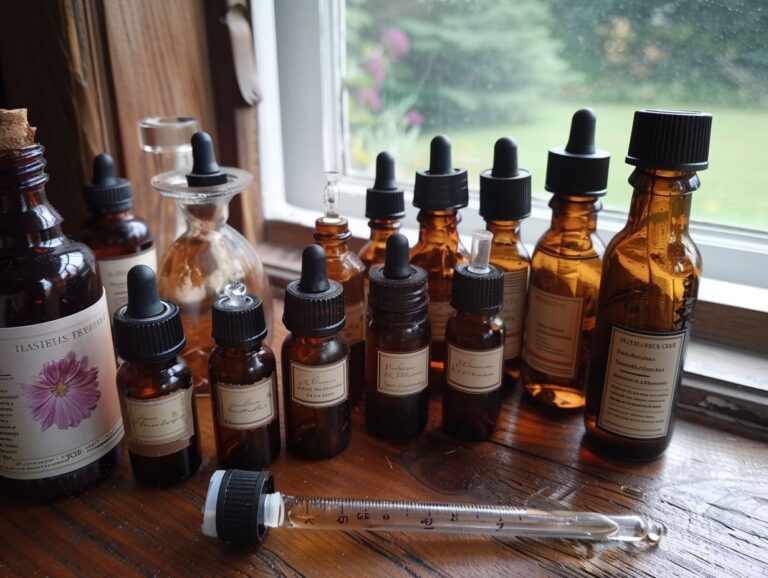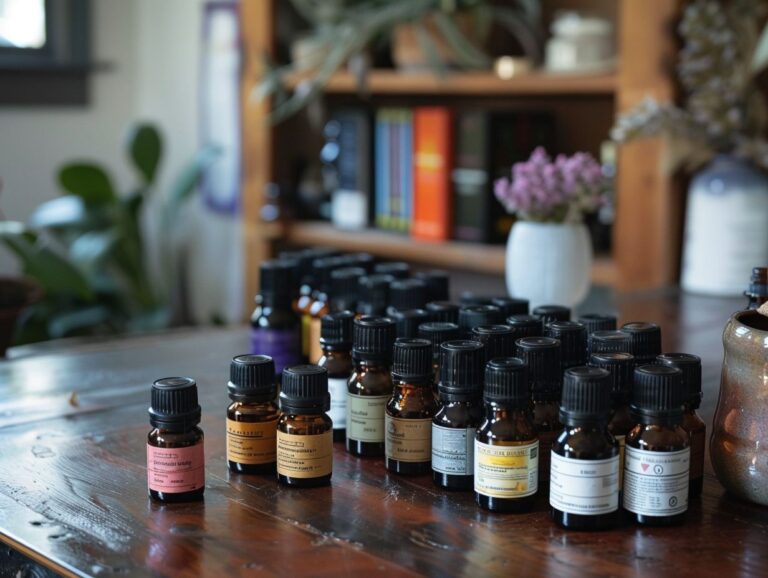What Essential Oils Are Good for High Cholesterol
High cholesterol is a common health concern that can lead to serious risks if left untreated.
This guide will cover the causes, symptoms, diagnosis, and treatment options for high cholesterol.
We will discuss the use of essential oils as a natural remedy for managing cholesterol levels.
From bergamot to lavender, learn how these powerful oils can help improve your health.
Discover how to safely incorporate essential oils into your routine and minimize any potential risks or side effects.
Key Takeaways:
What is High Cholesterol?
High cholesterol refers to high levels of LDL (low-density lipoprotein) cholesterol in the blood, often termed ‘bad’ cholesterol, which can contribute to plaque formation in the arteries.
This build-up of plaque can lead to atherosclerosis, a condition where the arteries become narrowed and hardened, increasing the risk of heart disease and stroke. On the other hand, HDL (high-density lipoprotein) cholesterol, known as ‘good’ cholesterol, plays a crucial role in removing LDL cholesterol from the bloodstream, helping to prevent the build-up of plaque. When the balance between LDL and HDL is disrupted, it can result in high cholesterol levels, which in turn can lead to serious health issues. Monitoring cholesterol levels through regular check-ups and adopting a healthy lifestyle can help manage and reduce the risk of high cholesterol-related complications.
What Causes High Cholesterol?
High cholesterol can be caused by various factors, including a diet high in saturated fats, genetics, lack of physical activity, and conditions that affect how the body processes cholesterol, leading to the buildup of plaque in the arteries.
The impact of high cholesterol on heart health is significant, as it can increase the risk of developing heart disease, heart attacks, and strokes. When LDL cholesterol levels are elevated, it can promote the formation of atherosclerosis, a condition where plaque builds up inside the arteries, narrowing them and restricting blood flow. This process can lead to serious cardiovascular issues and even life-threatening events if left untreated.
What Are the Risk Factors for High Cholesterol?
Several risk factors contribute to high cholesterol levels, including genetic predisposition, poor dietary choices, sedentary lifestyle, obesity, and underlying health conditions such as diabetes and inflammation, all of which increase the risk of developing cardiovascular disease.
Research has shown that individuals with a family history of high cholesterol are more likely to experience elevated levels themselves. Another significant risk factor is an unhealthy diet rich in saturated fats and trans fats, which can lead to an increase in LDL cholesterol levels in the body. Sedentary behavior and lack of regular physical activity are also contributors to the development of high cholesterol.
What Are the Symptoms of High Cholesterol?
High cholesterol typically does not present noticeable symptoms until it leads to serious complications such as a heart attack or stroke, making regular screenings and monitoring essential to detect and manage elevated cholesterol levels.
The absence of specific symptoms associated with high cholesterol can make it challenging for individuals to realize they have this health concern. This silent threat lurks within the body, increasing the risk of cardiovascular issues like heart attacks and strokes.
Without proper screenings and awareness of one’s cholesterol levels, the danger of these life-threatening events remains heightened. It is crucial for individuals, especially those with risk factors such as poor diet or a sedentary lifestyle, to proactively monitor their cholesterol levels to prevent potential health complications.
How is High Cholesterol Diagnosed?
High cholesterol is diagnosed through a simple blood test that measures the levels of LDL and HDL cholesterol, allowing healthcare providers to assess an individual’s risk of cardiovascular disease and determine the appropriate treatment plan.
Regarding getting a blood test for cholesterol levels, it is usually done after fasting for 9-12 hours to obtain accurate results. The test provides detailed information on the different types of cholesterol in the bloodstream, with LDL (low-density lipoprotein) often referred to as ‘bad’ cholesterol and HDL (high-density lipoprotein) as ‘good’ cholesterol.
- Blood tests play a crucial role in preventive healthcare as they help identify potential health risks early on, enabling healthcare providers to intervene promptly.
- By monitoring cholesterol levels regularly, individuals can take proactive steps to manage their cholesterol through lifestyle modifications, medication, and dietary changes.
What Are the Health Risks of High Cholesterol?

When cholesterol levels in the body are too high, they can lead to the buildup of plaque along the artery walls, narrowing the blood vessels and restricting blood flow. This process, known as atherosclerosis, can eventually result in blockages that impede the flow of oxygen-rich blood to vital organs like the heart and brain.
As a result, individuals with untreated high cholesterol are at a higher risk of experiencing severe cardiovascular events such as myocardial infarctions or strokes. These conditions can have devastating consequences on one’s health, leading to long-term implications and potential life-threatening outcomes.
What Are the Treatment Options for High Cholesterol?
Treatment options for high cholesterol include lifestyle modifications such as dietary changes, regular exercise, weight management, and medications like statins to lower cholesterol levels and reduce the risk of cardiovascular complications.
Reducing saturated and trans fats in the diet can significantly impact cholesterol levels. Incorporating more fruits, vegetables, whole grains, and lean proteins can promote heart health. Regular physical activity, such as brisk walking or cycling, helps raise HDL (‘good’) cholesterol and lower LDL (‘bad’) cholesterol. Weight management plays a crucial role, as excess weight can worsen cholesterol levels and increase cardiovascular risks.
Lifestyle Changes
Implementing lifestyle changes such as following a healthy diet low in saturated fats, engaging in regular physical activity, maintaining a healthy weight, and avoiding smoking can help manage high cholesterol levels naturally and promote overall health and wellbeing.
One key factor in a heart-healthy diet is incorporating plenty of fruits, vegetables, whole grains, and lean proteins while limiting processed and high-fat foods. These dietary choices can significantly impact cholesterol levels and reduce the risk of cardiovascular disease. It’s also important to monitor portion sizes and practice mindful eating to prevent overconsumption.
Plus diet, regular physical activity plays a crucial role in maintaining optimal cholesterol levels. Engaging in activities such as brisk walking, cycling, or swimming for at least 30 minutes most days of the week can enhance heart health and assist in lowering LDL (bad) cholesterol while raising HDL (good) cholesterol levels.
Medications
Medications such as statins, fibrates, and bile acid sequestrants are commonly prescribed to lower cholesterol levels, but they may also carry side effects such as muscle pain, liver problems, and gastrointestinal issues that need to be monitored closely by healthcare providers.
Statins are one of the most widely used medications to reduce cholesterol by inhibiting an enzyme that plays a key role in cholesterol production. They are generally well-tolerated, but some individuals may experience muscle weakness or liver abnormalities.
Fibrates, on the other hand, work by lowering triglyceride levels and may lead to gastrointestinal disturbances.
Bile acid sequestrants, which bind to bile acids in the intestines, can sometimes cause constipation or bloating.
Regular monitoring of these medications’ effects is essential to ensure their efficacy and safety.
What Are Essential Oils?
Essential oils are natural plant extracts known for their therapeutic properties, commonly used in aromatherapy for promoting physical and emotional wellbeing through their aromatic and medicinal benefits.
These oils are derived from various parts of plants, including flowers, leaves, bark, and roots, and are concentrated essences that capture the plant’s fragrance and properties.
Essential oils have been utilized for centuries for their healing and calming effects on the body and mind. When used in aromatherapy, these potent oils can uplift moods, alleviate stress, improve focus, reduce inflammation, and even aid in sleep quality. Incorporating essential oils into your daily routine can provide a natural and holistic approach to enhancing overall wellness.
How Can Essential Oils Help with High Cholesterol?
Essential oils such as bergamot, lemon, and peppermint have shown promise in managing high cholesterol levels due to their antioxidant properties and holistic approach to promoting cardiovascular health and reducing inflammation associated with elevated cholesterol.
One of the key benefits of using these essential oils is their ability to reduce oxidative stress in the body, which plays a significant role in the development of high cholesterol. Bergamot oil, for example, contains compounds that can help lower LDL cholesterol levels, also known as the ‘bad’ cholesterol.
Lemon oil is rich in vitamin C, a powerful antioxidant that can help prevent the oxidation of cholesterol. Peppermint oil is known for its soothing effects on the digestive system, which can indirectly impact cholesterol levels by promoting better digestion and nutrient absorption.
Bergamot Essential Oil

Research indicates that the active compounds in bergamot oil, such as bergamotin and polyphenols, play a pivotal role in regulating cholesterol levels. These components have shown to inhibit the production of cholesterol in the liver while simultaneously boosting the breakdown of fatty acids in the body. Studies have demonstrated that regular consumption of bergamot essential oil can lead to a significant decrease in LDL cholesterol, commonly referred to as ‘bad’ cholesterol, and an increase in HDL cholesterol, the ‘good’ cholesterol that aids in removing LDL. This dual action helps in reducing the risk of cardiovascular diseases and promoting overall heart health.
Lemon Essential Oil
Lemon essential oil is known for its antioxidant properties that help reduce inflammation and support heart health, making it a beneficial addition to managing high cholesterol levels naturally.
Lemon essential oil contains compounds such as limonene and citral, which are powerful antioxidants that neutralize harmful free radicals in the body. These antioxidants play a crucial role in reducing oxidative stress and inflammation, thereby promoting overall health and well-being.
Plus its antioxidant effects, lemon essential oil has been shown to have vasodilatory properties, which can help improve blood circulation and lower blood pressure. By relaxing blood vessels, this essential oil aids in reducing the strain on the heart and supports cardiovascular function.
Incorporating lemon essential oil into your daily routine may also help to decrease LDL cholesterol levels, known as the ‘bad’ cholesterol, while increasing HDL cholesterol levels, the ‘good’ cholesterol. This balance is essential for maintaining a healthy heart and reducing the risk of cardiovascular diseases.
Peppermint Essential Oil
Peppermint essential oil may aid in lowering high blood pressure, thanks to its antioxidant and anti-inflammatory properties, offering a potential natural remedy for individuals with elevated cholesterol levels.
Research suggests that the active compounds in peppermint essential oil can help relax blood vessels and promote better circulation, leading to a reduction in blood pressure levels. The oil’s anti-inflammatory effects can help reduce arterial inflammation, which is beneficial for overall cardiovascular health. By incorporating peppermint essential oil into a balanced lifestyle, individuals may support their heart health and potentially lower their risk of cardiovascular diseases associated with high cholesterol.
Lavender Essential Oil
Lavender essential oil is well-known for its calming and relaxing properties, which can help reduce stress and anxiety levels, contributing to overall wellbeing and potentially supporting heart health in individuals with high cholesterol.
Its soothing aroma is widely used in aromatherapy to promote relaxation and alleviate feelings of tension. Many studies have suggested that inhaling lavender essential oil may have a positive impact on the nervous system, helping to induce a state of calmness and tranquility.
The anti-inflammatory and antioxidant properties of lavender oil make it a popular choice for holistic health practices. With its versatile nature, it can be used in massages, baths, diffusers, or even added to skincare products to offer a myriad of therapeutic benefits.
Tea Tree Essential Oil
Tea tree essential oil is renowned for its skincare benefits, offering antimicrobial and anti-inflammatory properties that can promote skin health and potentially provide additional support for individuals managing high cholesterol levels.
Tea tree essential oil is a natural wonder that has been used for centuries due to its multitude of benefits on the skin. Its antimicrobial properties help combat bacteria on the skin’s surface, making it a popular choice for those dealing with acne or other skin infections. In addition, the anti-inflammatory effects of tea tree essential oil can soothe irritated skin, reduce redness, and calm inflammation. By incorporating tea tree oil into your skincare routine, you can harness its potential to improve overall skin health and achieve a clearer complexion.
How to Use Essential Oils for High Cholesterol?
Essential oils for high cholesterol can be used through various methods such as aromatherapy, topical application, and massage, but it is essential to follow proper dosage guidelines, conduct patch tests, and consider any precautions to ensure safe use.
When using essential oils for managing high cholesterol, it is crucial to select the right oils that are known for their cholesterol-lowering properties, such as lavender, peppermint, and lemon. These oils can be diffused using a diffuser for aromatherapy benefits or diluted with a carrier oil for topical application. For a relaxing effect, incorporating them into a massage oil can also be beneficial.
For dosage, it is recommended to start with a low concentration and gradually increase as needed, following the specific guidelines provided for each oil. Conducting a patch test before widespread use is important to check for any allergic reactions or sensitivities. It’s essential to consider any contraindications, especially if you have underlying health conditions or are pregnant, to ensure safe and effective usage of the oils.
Are There Any Risks or Side Effects of Using Essential Oils for High Cholesterol?

It’s crucial to recognize that essential oils, though often considered safe, can have powerful effects on the body. Individuals with high cholesterol should be aware that certain essential oils may not be suitable for their specific condition and could potentially worsen their health if used improperly.
Consulting healthcare professionals before incorporating essential oils into a treatment plan is recommended to ensure compatibility and minimize any adverse effects. Being transparent with your doctor is key as they can provide valuable insights on potential contraindications.
Frequently Asked Questions
What essential oils are good for high cholesterol?
There are several essential oils that have been shown to help lower high cholesterol levels, including lemon, peppermint, cinnamon, and frankincense.
How does lemon essential oil help with high cholesterol?
Lemon essential oil contains high levels of limonene, a compound that has been found to lower cholesterol levels and improve heart health.
Can peppermint essential oil help with high cholesterol?
Yes, peppermint essential oil has been shown to have cholesterol-lowering effects due to its high concentration of menthol, which can help improve blood flow and reduce cholesterol levels.
What is the best way to use cinnamon essential oil for high cholesterol?
The most effective way to use cinnamon essential oil for high cholesterol is by diluting a few drops in a carrier oil and massaging it onto the chest and neck area.
Is frankincense essential oil safe for people with high cholesterol?
Yes, frankincense essential oil is generally considered safe for people with high cholesterol and may even help improve lipid levels in the blood.
Can essential oils be used as a replacement for medication for high cholesterol?
While some essential oils may have beneficial effects on high cholesterol levels, they should not be used as a replacement for medication prescribed by a healthcare professional. It is important to consult with a doctor before making any changes to your cholesterol management plan.







